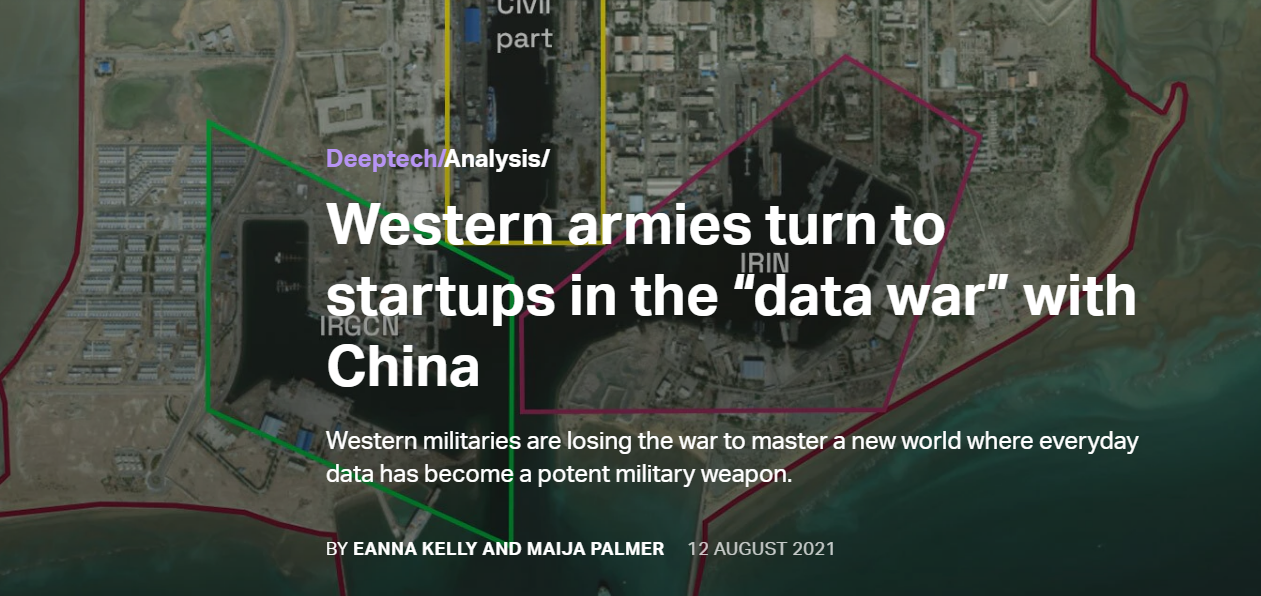
Western Armies turn to Start-ups in the “Data War with China”
The Article below is from Sifted published 12/08/2021
Western militaries are losing the war with China. Not a conventional war, but the war to master a new world where every day data has become a potent military weapon.
“Every military is looking at AI as the big gamechanger,” says Charlie Curtis, partner at French innovation consultancy Sia.
Richard Gwilliam of British geospatial intelligence company Geollect says that Western militaries have been “caught on the hop” by Russia and China and are only now beginning to think seriously about how to exploit masses of freely available data.
“Russia and China have been absolutely superb on asymmetric warfare — we’re playing catch-up.”
“What Russia and China have done is, instead of just competing with us on platform warfare, they’ve been absolutely superb on asymmetric warfare — we’re playing catch-up,” Gwilliam said.
He cites cyberattacks, misinformation and interference around Brexit and the Trump election as examples where Russia and China have successfully manipulated everyday tech like social media to destabilise the US and Europe.
Western militaries have noticed this, and as well as launching their own operations to counter misinformation (and so their own divisions) they have also turned to young private sector companies for help.
Gwilliam’s company, based in Bristol, is one of those, recently chosen by the UK Ministry of Defence to provide data to the Royal Navy, to help it prepare and implement psychological operations, or “psyops”.
The mission follows a recent skirmish between the Navy and Russian forces in the Black Sea, described by experts as an example of “information warfare”, with competing claims from Russian and British sides about the origin of the dispute.
Geollect: Power of a Small Company
Geollect was founded in 2018 by Gwilliam and his wife Cate, who is CEO, as “a concept borne out of the explosion of data and how powerful that was,” said Gwilliam, who previously served 28 years as an intelligence officer with the Navy.
“We got frustrated after seeing how one of the biggest problems for militaries is data sharing.”
“We got frustrated after seeing how one of the biggest problems for militaries is data sharing,” he said.
Geollect specialises in collecting raw information — from sources including Automatic Identification Service (AIS) vessel tracking, social media, satellites, Janes Intelligence and BBC monitoring data — and building platforms to understand where and when threats exist.
Aside from military work, Geollect gets the rest of its revenue from contracts with cruise ship companies and mutual marine insurance associations. The company monitors and filters climate and political data likely to affect fleets and ensures that the latter comply with regulations especially regarding international sanctions. According to Gwilliam, Geollect currently monitors 60k vessels all over the world, 24/7.
What the company has to offer is a solution to information overload, Gwilliam explained. “There’s an ocean of data but what people are interested in are insights — we can help them here,” he said.
“There’s something like a billion touchpoints a day on AIS — we make sense of all that and map patterns of activity. Then we create scripts using machine learning to detect anomalies and send out alerts if need be. It’s a fully automated service,” Gwilliam said.
“Armies don’t have coders and developers so more and more, they’re competing with SMEs.”
Militaries have “no choice” but to engage newcomers from the private sector, Gwilliam said. “Data science is not a known military branch you can go into. Armies don’t have coders and developers so more and more, they’re competing with SMEs.”
The new system Geollect is building for the Navy will help detect misinformation from adversaries. “It’s using data to build better counter-propaganda,” Gwilliam said.
The project follows a recent high profile incident that saw the UK embroiled in a diplomatic and military dispute with Russia after one of its ships sailed through territorial waters off the coast of the disputed territory of Crimea.
The warship sailed for about an hour within the 12-mile limit off Cape Fiolent on a direct route between the Ukrainian port of Odessa and Georgia, prompting Russian complaints and a disagreement about whether warning shots were fired.
Young Guns
Unusually for a defence company, Geollect is full of young university recruits. “It’s all untarnished post-graduates, PhDs and Master’s students. Most defence companies will entice senior defence figures to join them but then it becomes a massive groupthink; a self-licking lollipop,” said Gwilliam, whose son has also joined the company.
He said the best way to shift the military’s path is from the outside.
Legacy systems can’t move fast enough on tech: “You need to be an agile company to make use of it. Military procurement is convoluted. Internally, understanding of the power of data doesn’t always happen — there’s sometimes a lot of resistance too,” he said.
To get started, Geollect raised £500k from investors and will likely fundraise again to keep the company ticking while it waits on the results of several procurement bids.

Gwilliam says he has already had approaches from two billion pound-plus companies about buying Geollect.
But he’s holding out for the right fit. “For us, you’ve got to be realistic — if you land those unicorn opportunities, those deals allow the company to become really significant. If you want to have a long term influence, an acquisition by someone like BAE [the British aerospace company] and its resources would accelerate the business by about 20 years.”
Gwilliam hopes the next five years will see the company “ingrained as a supplier in the US, the UK and spreading into Europe,” he said.
“We set out to be the best in the world and I think it’s fair to say we’re being recognised as the best at what we do.”
He’s relieved his big career punt is paying off. “It gave me grey hairs but has also been such an adventure; to have two of you leave well-paid jobs was such a gamble,” he said (CEO Cate left her position at the US National Geospatial Intelligence Agency). “My pension went into setting this up.”
But it has been fantastically enjoyable.
“A lot of people raised their eyebrows when we went with such young recruits. These guys have done a tremendous job. We have a family of 18 here,” he said.
Read the full article here: Western armies turn to startups in the “data war” with China | Sifted